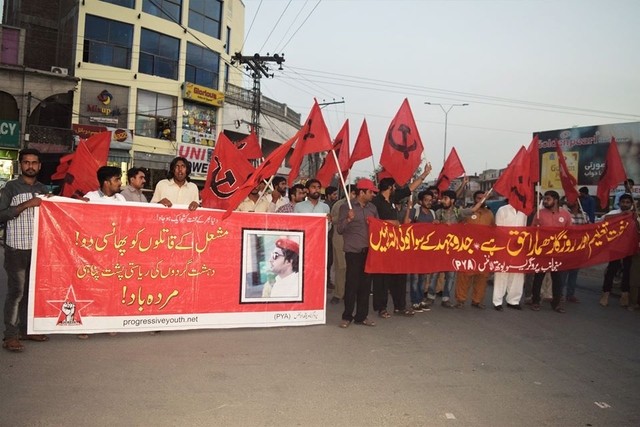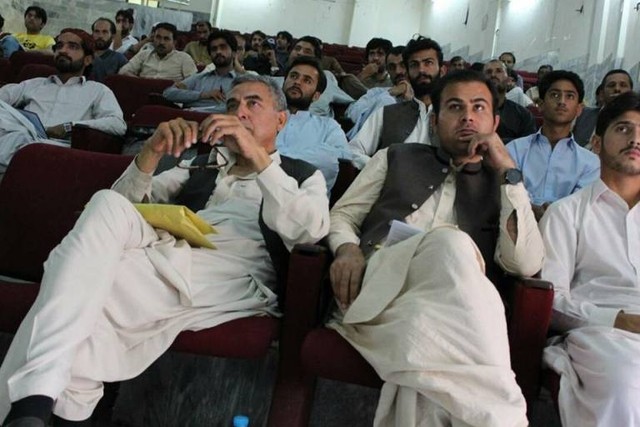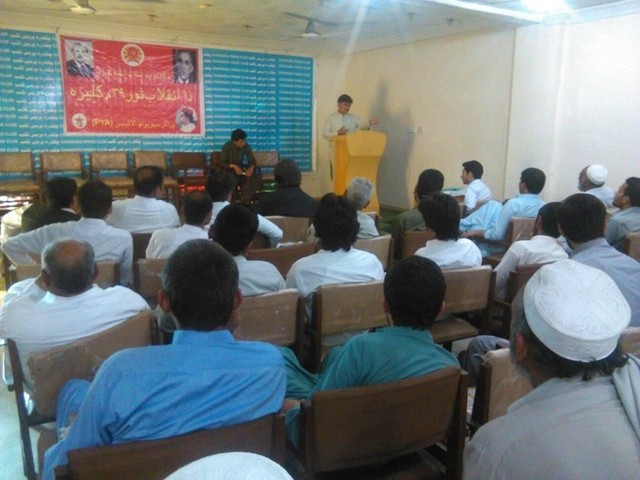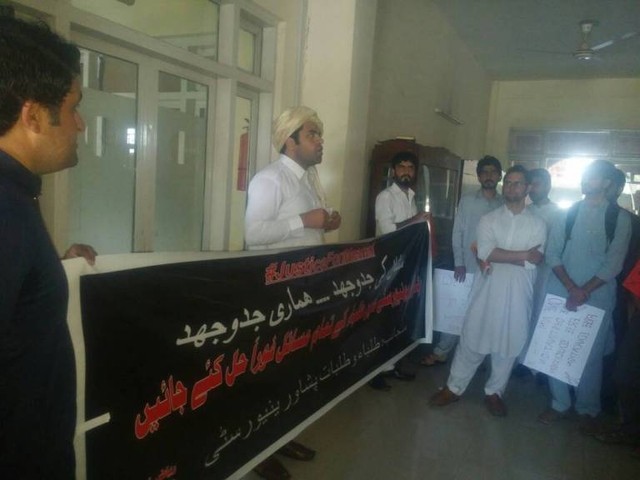The view south from Turkmenistan, Uzbekistan, and Tajikistan as spring sets in must be cause for some apprehension. Across the border, the security situation in northern Afghanistan has been sharply deteriorating since 2014.
For the previous decade or more, northern Afghanistan had been a relatively peaceful area -- particularly in the northwest, far from the problems of the Kabul, Kandahar, and Jalalabad regions of Afghanistan. During this more peaceful time, Turkmenistan, Uzbekistan, and Tajikistan implemented projects -- bridges, railways -- to better connect them to their southern neighbor.
There was fighting throughout this last winter in the Afghan provinces bordering Turkmenistan and Tajikistan, and the usual Taliban spring offensive is expected soon. If you listen to some Afghan officials, and others, it's not only the Taliban who are a threat in northern Afghanistan now.
There are some militant groups that include Central Asian nationals.
There is also a pro-Islamic State (IS) radio station calling itself Sedai Khelafat, mobile and with very limited range, which now broadcasts in northern Afghanistan, often in the Tajik and Uzbek languages.
And this year, there are also creeping suspicions among some in Afghanistan that the governments in Turkmenistan and Tajikistan are dealing with people in Afghanistan whom the Afghan government considers the enemy.
It's a chaotic situation that promises to become much worse very soon, all the more so since some of the Central Asian militants who went to join IS or other militant groups in Syria and Iraq are reportedly making their way back from inevitable defeats there to Afghanistan.
So with spring coming, Qishloq Ovozi takes a look at what has been happening recently in the northern Afghan provinces that border Tajikistan and Turkmenistan.
There is violence in Balkh Province (which borders Uzbekistan), the Taliban attack on the German Consulate in November being one example. But in Balkh, the violence is either lower than in the three provinces to the east and four to the west, or bloodshed receives less media coverage. In any case, it is not part of this review.
The situations in Bahglan, Samandar, and Sari Pul, which are just south of Takhar, Kunduz, Balkh, and Jowzjan, and east of Faryab, are arguably worse than in those provinces bordering Central Asia. But since they are not on the frontier with Central Asia, they are also excluded from this review.
The View South From Turkmenistan
The length of the Turkmen-Afghan border is 744 kilometers, although, as is the case with the Tajik-Afghan border, there are other figures for this frontier.
The Amu Darya River forms about the first 100 kilometers of the eastern Turkmen-Afghan border before turning sharply north, heading toward the Aral Sea.
From there, the Turkmen-Afghan border dips toward the southwest through relatively flat, sandy land, much of which is in or on the edges of the Gara-Gum (Kara-Kum) Desert. One more river -- the Murghab -- forms some 16 kilometers of Turkmenistan's border with Afghanistan's Badghis Province.
The Afghan provinces that border Turkmenistan are, from east to west: Jowzjan, Faryab, Badghis, and Herat.
This area was arguably the most peaceful part of Afghanistan for more than a decade after the U.S.-led military operation started in late 2001.
The situation started to change in spring 2013, when hundreds of Taliban militants fought a weeklong battle with government forces in the Qaysar district of Faryab Province.
A small number of militants from the Islamic Movement of Uzbekistan (IMU) had already started arriving in northwestern Afghanistan to help train local Taliban fighters, including teaching them how to make improvised explosive devices.
Pakistan's military operation in North Waziristan in summer 2014 pushed a large group of IMU fighters and their families (hundreds of them at least) into Afghanistan with many making their way to the northwestern provinces bordering Turkmenistan. Violence increased noticeably across northern Afghanistan after their arrival.
In late 2015, another group of IMU fighters arrived in Herat Province. This group was reportedly sent by IMU leader Usman Ghazi after he declared the group's allegiance to the IS militant group. Their purpose in Herat was to fight alongside a Taliban splinter group that had also declared loyalty to IS, in a battle with a group of "traditional" Taliban fighters.
The traditional Taliban faction eventually crushed their opponents, but some of the pro-IS IMU and Taliban militants escaped into other areas of northwest Afghanistan.
Residents and officials in Jowzjan Province blame IS for burning down some 60 houses in a village in late December and for killing six Afghan employees of the International Committee of the Red Cross in early February.
In late October, Rahmattulah Hashar, the head of Jowzjan's Darzab district, said the "armed people of Daesh [IS]" captured four villages in his district. The Afghan Islamic Press reported IS militants had killed a Taliban commander in Darzab and captured nine Taliban fighters.
In the extremely confusing situation in northwest Afghanistan, it is often difficult to say who exactly the enemy is. Afghan officials have repeatedly said that some militants, especially the foreign militants, alternate between calling themselves Taliban and IS.
Hashar does make a distinction, as he has specifically accused the Taliban of attacks in his district. And the Taliban does have a presence in Darzab district. A spokesman for the Jowzjan governor's office, Mohammad Reza Ghafari, said on February 15 that Taliban fighters abducted 52 farmers in Darzab. Taliban spokesman Zabihullah Mujahid confirmed their capture, saying the farmers were "planting on disputed land" and a Taliban court would decide whether to punish them.
Darzab is in the southern part of Jowzjan Province. The two districts bordering Turkmenistan -- Qarqeen and Khamyab -- where the government exerts at best tenuous control, have been relatively quiet in recent months, possibly due to an offensive that Afghanistan's vice president, General Abdul Rashid Dostum, led in Jowzjan and Faryab provinces in October.
An earlier security operation led by Dostum in October 2015 in the Khamyab district chased militants to an island in the Amu Darya, where the latter encountered border guards from Turkmenistan. The episode ended peacefully for the Turkmen border guards, who instructed the militants to return to the Afghan side of the river. For the militants, it reportedly
ended in annihilation once they reached the south bank of the river.
More worrisome for the Turkmen government are events in the Ghormach district of Faryab Province. In mid-September, the Taliban launched an offensive in Faryab's southern Qaysar, Pushtun Kot, Khwaja Sabz, Almar, and Ghormach districts. On October 11, the Taliban captured Ghormach and held it for some 10 days before Dostum's attacks chased them from the district.
More than two years earlier, on May 24, 2014, an armed group crossed from Ghormach into Turkmenistan,
killed three Turkmen soldiers, and took their weapons back with them into Afghanistan.
Further complicating the situation, in mid-March, fighting broke out between supporters of two pro-government parties, Jamiat-e Islami and Junbesh-e Melli Islami. At least five people were reported killed. Eight policemen were also wounded when both sides opened fire on them. The same two groups were
involved in violence in Faryab in March 2016.
The first militants to cross the Turkmen border
did so in February 2014 from the Badghis Province. They killed three Turkmen border guards.
Badghis has not seen the intensity of fighting witnessed in the Faryab and Jowzjan provinces recently, but it has become the second-largest area of opium-poppy cultivation in Afghanistan, according to a
2016 report from the UN Office on Drugs and Crime.
In addition to the problems in Jowzjan, Faryab, and Badghis, the biggest concern for Turkmenistan at the moment just came from Herat. On March 8, an influential mujahedin commander from the days of the Soviet occupation, Ismail Khan, accused the Turkmen government of supplying arms to the Taliban. Khan said he told Turkmen Foreign Minister Rashid Meredov that "weapons [sent] to Herat are supplied from Turkmenistan." (There has been fighting for weeks in Herat's southern Shindand district.)
Turkmenistan quickly dismissed Khan's accusation as "baseless," but more people in northwest Afghanistan are likely to believe Khan than the Turkmen government.
Turkmenistan is officially a neutral country, a designation granted by the United Nations in 1995. Turkmenistan successfully stayed out of the Afghan conflicts of the 1990s by remaining neutral. The killing of Turkmen troops by militants from Afghanistan raises questions about how much respect fighters in northwest Afghanistan now have for Turkmenistan's neutrality.
The Turkmen government is at least hedging its bets. Since the incidents in 2014, Turkmenistan has significantly increased defense spending, called up reserves, and reportedly deployed some 80 percent of its forces along the frontier with Afghanistan.
The Turkmen government has also pursued an often erratic policy toward the neighboring Afghan provinces, at first making contact with villages across the frontier and offering help with projects for river containment, electricity, and various forms of humanitarian aid, then changing policies and constructing barriers and ditches on the Turkmen side of the border.
Officially, Ashgabat says there are no problems along the Afghan border.
The View South From Tajikistan
The length of the Tajik-Afghan border is unclear. The two most widely used figures for the border length are 1,206 or 1,344 kilometers. But if you drew a straight line from the easternmost point of their common border to the westernmost part, the distance would be about half that. The border zigzags from the east, through the Pamir Mountains until it hits the headwaters of the Pyanj (later Amu Darya) River, after which the meandering river becomes the border.
Most of the Tajik-Afghan border runs through the Pamir Mountains, only the last several hundred kilometers of the western frontier pass through the lowlands.
The Afghan provinces that border Tajikistan are, from east to west, Badakhshan, Takhar, and Kunduz.
In addition to Taliban fighters in these provinces there are also members of a group Afghan officials called Jundallah, a militant band that originated in Central Asia and first appeared in the late 1990s as the IMU and was allied to the Taliban and Al-Qaeda. The IMU sheltered with the Taliban in Pakistan's tribal areas in the first years after the U.S.-led operation started in late 2001.
IMU fighters have been trickling back in northeastern Afghanistan to link up with Taliban units for more than a decade, and several times during this period conflicts with Pakistani tribesmen or Pakistani military operations pushed groups of IMU fighters back into Afghanistan. In recent years, this IMU group was absorbed by its Tajik wing, Jamaat Ansarullah. The originally Uzbek-dominated group now includes several nationalities and is under Tajik command.
This group has maintained its alliance with the Taliban, unlike an IMU group in northwestern Afghanistan.
In late September 2016, the Taliban and Jundallah launched an attack on the provincial capital, Kunduz, briefly seizing it as they had done almost exactly one year earlier. The Taliban also briefly seized Kunduz Province's Qala-e Zal district, which borders Tajikistan. Fighting continues in that district and in the neighboring Imam Sahib district that also borders Tajikistan.
The militants also attacked in the neighboring Takhar and Badakhshan provinces in late September. They overran four districts in Takhar Province, two of which -- Khwaja Gar and Yangi Qala -- directly border Tajikistan.
Another district that borders Tajikistan -- Darqad, in the far northwest of Takhar Province -- has been under Taliban control for some time. There was a drone strike there at the start of March that Afghan forces say killed 15 Taliban militants and that followed Afghan air strikes on Darqad in late February.
Darqad is also the source of serious problems now between the Afghan, Tajik, and Russian governments. (More on that later.)
During that late September offensive, the Taliban also briefly captured two central districts in Badakhshan -- Wardoj and Baharak. Wardoj district has changed hands between government and militant forces several times since 2009.
The government now claims to have control over most of these districts, but attacks and assassinations continue to occur frequently in these three provinces and thinly stretched Afghan government troops move almost constantly from one hot spot to the next.
Kunduz Governor Assadullah Amarkhel said at the start of March that the Taliban were planning to attack the city of Kunduz again. Badakhshan Governor Ahmad Faisal said at the start of March he expected a military operation to start soon to recapture the Yamgan and Wardoj districts in his province. At the end of February, the Afghan National Army announced it had recaptured 14 villages in three districts of Takhar Province.
Of course all of this is a concern to Tajikistan's government -- although not so much because of the threat of the Taliban crossing the border. After all, Tajikistan hosts a Russian military base and together with the Russian military Tajik authorities have established three layers of defense in the Afghan border region.
But the presence of Jundallah, a militant group commanded by ethnic Tajiks, including some from Tajikistan, is something to worry about, especially as the Tajik government cannot claim to enjoy much popularity among its people.
A reported IS presence in the northeast is also causing unease, not only in Dushanbe but in Moscow as well, and that has raised questions in Afghanistan about possible connections the Russian and Tajik governments might have with the Taliban.
At the end of 2015, Tajikistan's independent Asia-Plus news agency reported that Russian officials met that summer with Taliban representatives at the Kulob military base, where Russia's 201st Division was stationed at the time. One of those Taliban representatives was identified as Qari Dinmuhammad Hanif, the commander who controlled the Darqad district in Takhar Province.
Since then, it has become clear that Russia is
in contact with the Taliban. Moscow opened a channel to the Taliban after IS appeared in eastern Afghanistan, ostensibly because the Taliban was more effective than government troops at fighting IS in Afghanistan.
Provincial officials and military commanders in Badakhshan, Takhar, and Kunduz have blamed security setbacks on Russia supplying local Taliban units with arms. Afghan Channel 1 TV reported on February 28 that Russia was supplying arms to the Taliban units in Kunduz's Qala-e Zal, Iman Sahib, and Dasht-e Archi districts.
The same accusation has been made to justify Afghan government forces' failure to retake the Darqad district of Takhar Province.
And some Afghan officials have gone so far as to claim Tajikistan was allowing Taliban vehicles entry onto its territory for repair, allowing wounded Taliban to be treated at medical facilities in Tajikistan, and turning a blind eye to militants sheltering on heavily wooded islands in the Pyanj River.
Tajik authorities deny all this, and Russia denies giving weapons to the Taliban. But the mounting distrust serves to further complicate an increasingly chaotic situation.












